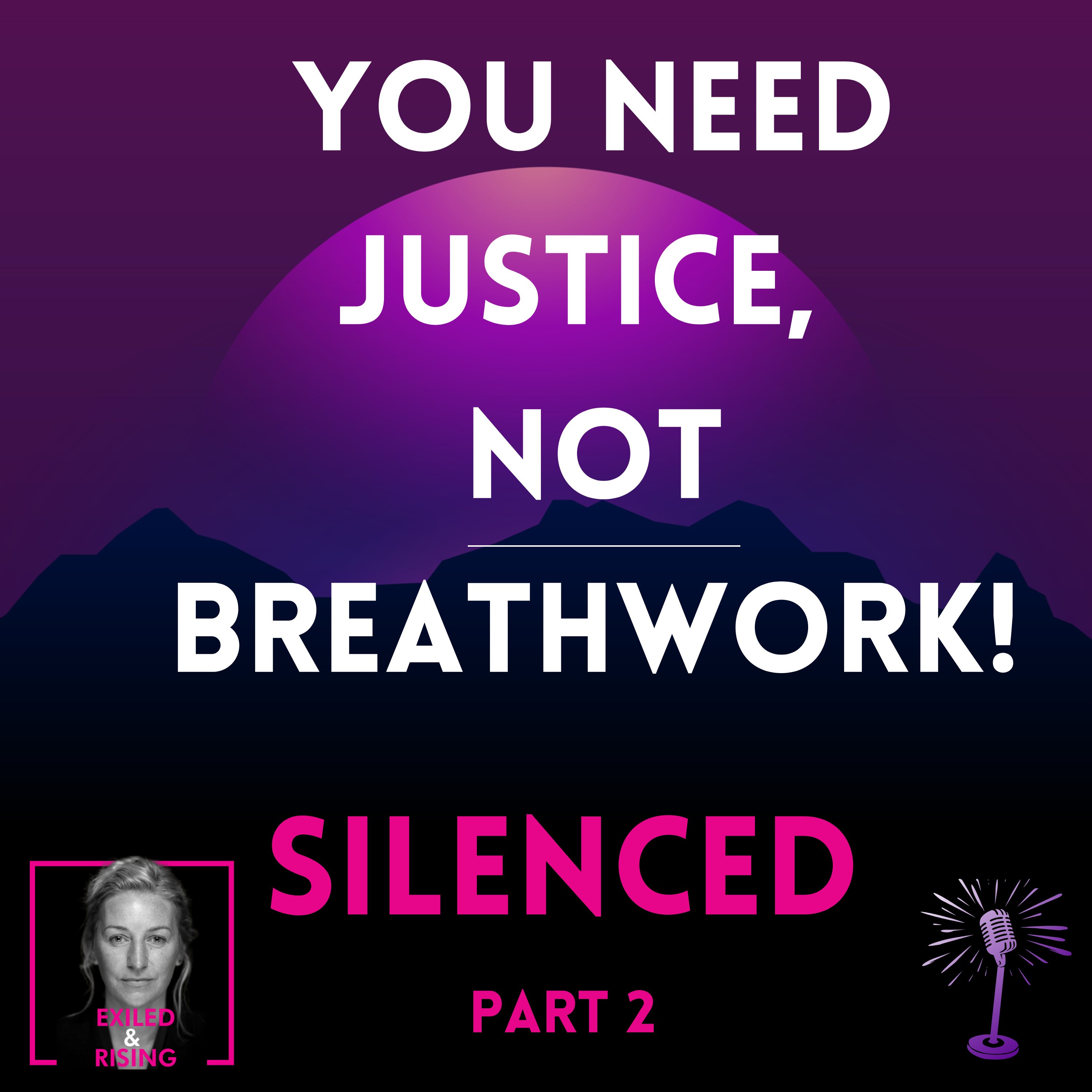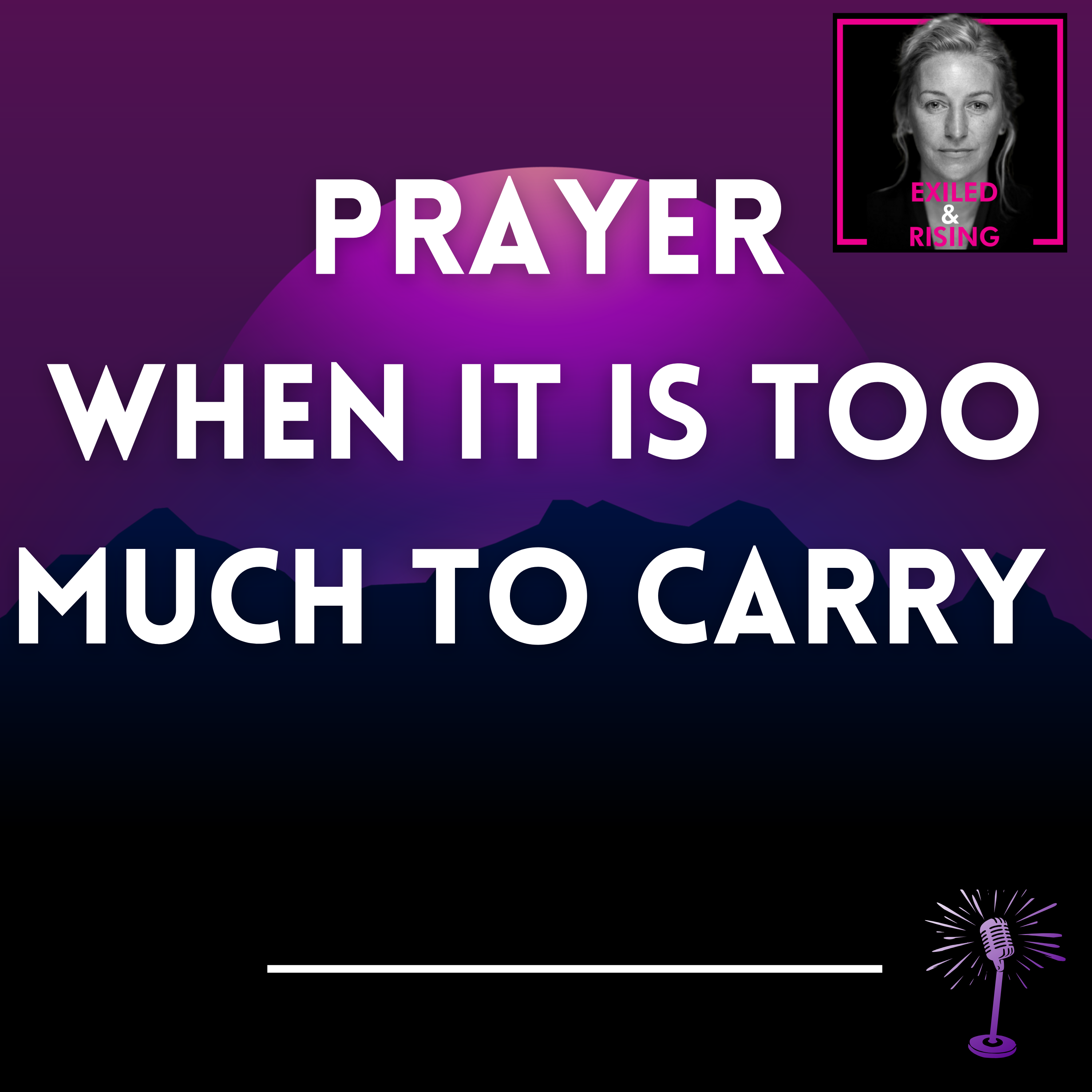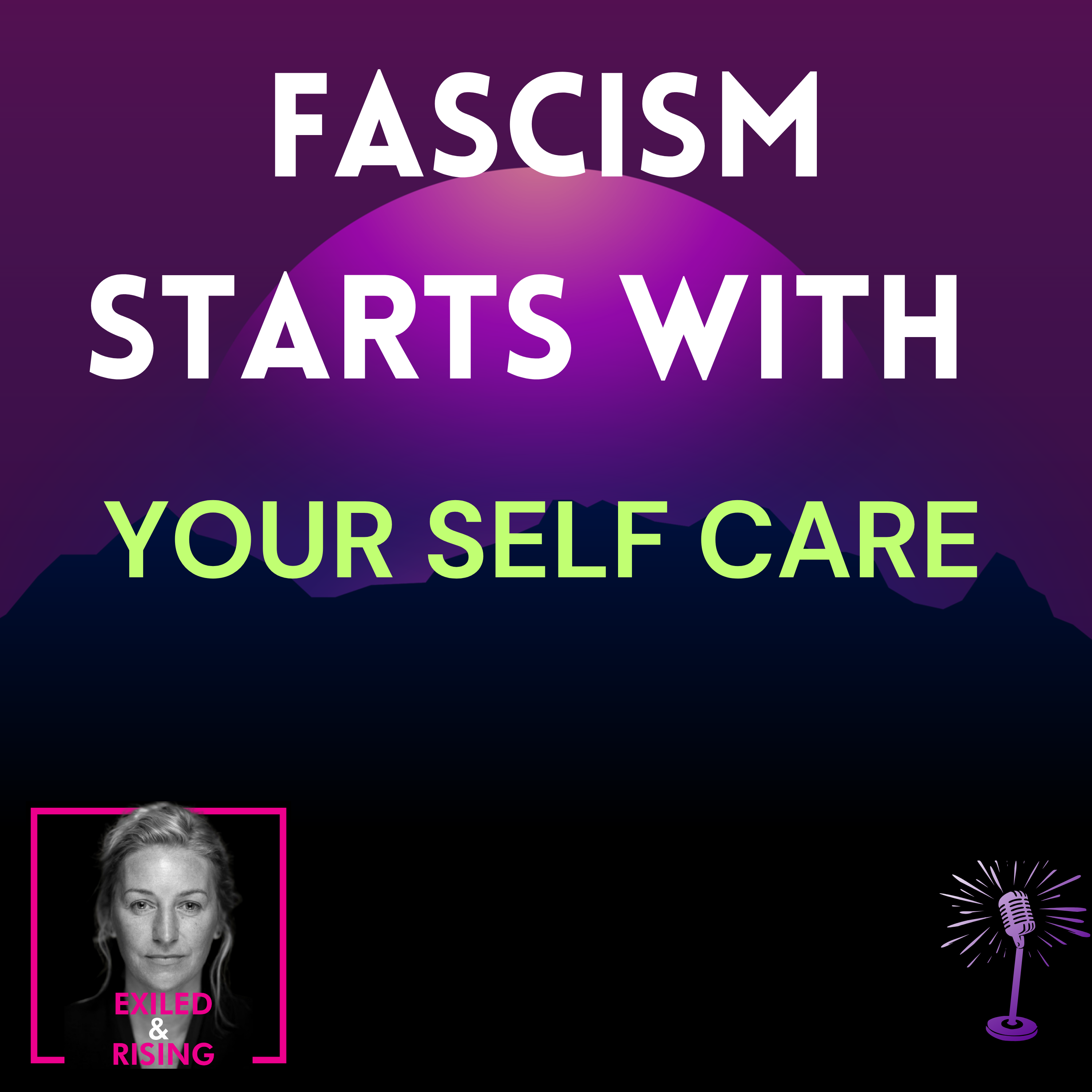Episode Transcript
[00:00:00] Start speaking out. Start calling spiritual bypassers a spiritual bullshitter. Okay, rewind that so I don't need to repeat.
[00:00:12] So you're not dysregulated because you are weak.
[00:00:16] You are dysregulated because you over silenced or you're still silenced.
[00:00:26] Your silence is not neutral.
[00:00:30] It's active complicity in continued suffering you went through. And now you're passing this to your kids, to your descendants.
[00:00:42] And that's not okay.
[00:00:44] That's not okay. Don't leave this planet with this legacy.
[00:00:49] It wouldn't be right for you. Between you and you.
[00:00:54] You know it's not right.
[00:00:56] Okay.
[00:00:58] So silence is not grace.
[00:01:03] Welcome to Excel in Rising. I'm Anna Mail. I'm Somatic experiencing therapist for PTSD and trauma recovery. I am founder of Somatic Trauma Recovery Center.
[00:01:14] Today I will read. We will not talk about it. It's from the book the Trauma we don't talk About.
[00:01:23] And then we'll move to deep dive and analysis of the piece.
[00:01:28] We will not talk about it.
[00:01:33] Trauma, silence, all your experiences, that's the main cause of ptsd.
[00:01:41] Prolonged conditioned silence.
[00:01:46] If you are able to talk, you would be able to process what happened to you.
[00:01:52] It would move out of your system.
[00:01:56] You would be able to connect with someone who could give you professional resources and help.
[00:02:03] You would feel listened to.
[00:02:06] You would feel safe.
[00:02:09] Your mind eventually would feel at ease.
[00:02:15] And you would process your shock through the time.
[00:02:19] Through the time. It takes time, but you would be able to process what happened to you.
[00:02:31] Your grief would arise and be held and someone would show up for you.
[00:02:38] It would take time, but your trauma would be processed and released, not stored in silence.
[00:02:51] Your shame wouldn't sneak in to push that trauma even deeper inside of you, isolating you from the people around you.
[00:03:05] When we push down our experience into our body, into our soma, we are depressing our state.
[00:03:18] So think about depression as depressing.
[00:03:25] What happened to you.
[00:03:29] Depressing means not speaking out.
[00:03:33] It means silence. You in in very constricted, scared, filled with fear and theory body.
[00:03:48] So when someone has no voice and no movement, we know they have trauma.
[00:03:59] And notice how rarely you were able to use your voice growing up.
[00:04:05] Notice the silence of your family or your community.
[00:04:12] Even now, if you're adult, living in a place, in a culture, in a family of silence, how quiet are you in the past? Was, uh, speaking out about what happened to you even an option?
[00:04:41] Were you able to safely say how you felt or describe your experience?
[00:04:47] Was there even anyone to hear you?
[00:04:51] Or were you sent to Your room or told not to talk about it.
[00:04:59] Stay loyal to your family.
[00:05:04] Was there a fear of reprisal if the abuse was made in public?
[00:05:13] So remember, what didn't get a chance to be processed, what was shamed into isolation and silence, into a feeling of inadequacy and confusion becomes trauma. So let me repeat this.
[00:05:35] What didn't get a chance to be processed, what was shamed into isolation and silence, into a feeling of inadequacy and confusion becomes trauma.
[00:05:57] So trauma, many times is not one event.
[00:06:07] It can be continuous state of someone making you confused.
[00:06:15] When you know what was done, how you were treated was not fine.
[00:06:23] It was off.
[00:06:25] It was off.
[00:06:28] And it can be so subtle.
[00:06:32] And that's the starting point of feeling confused.
[00:06:36] It's a big sign.
[00:06:39] It's a big sign.
[00:06:42] And if that was happening through the years, that becomes trauma.
[00:06:51] That state of being continuously confused becomes trauma because it moves you to the state of feeling less of state of being ashamed. And you don't even know why.
[00:07:12] Notice how silence was the fertilizer of your trauma and how it was cultivated and then passed down, um, in your family, the gardeners of your suffering, while making you feel loyal to the family.
[00:07:41] Because if you spoke up, you would feel as you're someone who is betraying your family.
[00:07:52] It's a very, very, very confusing space to be in.
[00:07:58] And nothing keeps abuse more alive and intergenerational than silence, family loyalty, oppression, and survival guilt.
[00:08:17] Don't let that voice sit inside of you.
[00:08:24] Share it.
[00:08:26] Speak up. That doesn't mean it needs to be confession.
[00:08:31] Nowadays, people are thinking they're authentic and they're helping others by confessing all their lives on social media.
[00:08:46] No m. No.
[00:08:49] But you can share it in contained, safe space.
[00:08:54] You can write out.
[00:08:56] It can be sharing that voice between you and you through your journaling record.
[00:09:09] Speak in safe groups. This is how you start share with your kids.
[00:09:16] They need to know.
[00:09:18] They need to know.
[00:09:20] Start sharing with your siblings, if they're even open to it. If they're not, you find your soul family. You find your own soul family, your adoptive family.
[00:09:34] You're not alone in this. Absolutely not. If your family made you feel alone, that doesn't mean you're alone in your city, in your country. We are so connected now through online space.
[00:09:54] So let me know in comments, what was your experience of witnessing silence in your family and being silenced through generations and how you're moving out? Are you moving out?
[00:10:13] And what was the cost of being silenced?
[00:10:20] Because silence is not just absence.
[00:10:24] Silence is the Mechanism by which trauma survives. And it's so important in that moment, in the moment, it's better to be silent.
[00:10:38] And also there is a point where being silenced is too costly for our well being, for our mental health, for our physical health.
[00:10:49] And also what redefines trauma as not only what happened, as I said, but what wasn't allowed to be said.
[00:11:03] And here we can link somatic freezing.
[00:11:07] Okay, so I will talk as a somatic experiencing therapist for PTSD and trauma recovery for my students.
[00:11:15] Okay, another therapist.
[00:11:18] So when we have somatic freezing and emotional suppression to external conditions, what that tell us this is.
[00:11:36] So tag this in your mind or rewind, keep really this in your awareness.
[00:11:47] If you live in a rigid body, okay, Muscles. So pain in your muscles, you can't move, Pain in your neck, there is just awkwardness like you're walking as a robot or you're just not able to move, you don't want to move, it's too heavy.
[00:12:07] So when we have this landscape of freezing rigidness with emotional suppression, that happened because of external conditions, Those external conditions is your family where you lived or family you're living right now, right? Or relationship you're in.
[00:12:32] But that's not because of your personal inadequacy.
[00:12:39] Let me repeat that.
[00:12:42] This is not because something is off, uh, with you.
[00:12:47] This is not because of internal conditions, but external. There is nothing wrong with you.
[00:12:58] Your body is moving through survival because something outside is not safe. So that outside doesn't mean outside in a different country, that someone who is maybe sitting next to you in this moment.
[00:13:20] Okay, so you're not dysregulated because you are weak.
[00:13:30] You are dysregulated because you over silenced or you're still silenced.
[00:13:40] And you were silenced because you were not feel safe with that person or people you lived with or you went to the school, or you're in your place of work.
[00:14:00] So you're not dysregulated because you're weak. You're dysregulated because you were silenced. You were not at the place where you would feel safe.
[00:14:17] So what would be the trauma processing, how would that look like?
[00:14:22] Is safe relational witness.
[00:14:29] So right now you and I, there is relational witnessing. Even you cannot see me or I cannot see you, but you can feel that relational field of my voice, of um, my experience talking to you.
[00:14:54] Okay, Second processing and healing happens when grief is met with co regulation.
[00:15:08] When that grief can be processed not by fixing, not by doing, not by pushing through, but it can just be met in that place of Holding.
[00:15:21] Okay.
[00:15:23] Someone who can just say, sit here.
[00:15:28] Your experience was real, even though it was confusing for you, or it wasn't confusing, it was very real, but it couldn't be expressed. And this is how you survived.
[00:15:44] Can let us be here together.
[00:15:50] We cry, sit in silence, moan, move, follow your body. What needs to be, what needs to express.
[00:16:09] That's how your body starts to speaking up. Uh, without words. We don't need to have words.
[00:16:16] Okay?
[00:16:19] Third is time and space to integrate.
[00:16:24] And it's time and it's pace to integrate in healing, the less is more, people, the less is more.
[00:16:39] Don't jump. Don't jump to 5,000 workshops and 5,000 retreats.
[00:16:49] You need to integrate one, one healing tool at a time.
[00:16:55] Your body needs to regulate and to integrate that.
[00:16:59] So we know in somatic, uh, therapy, body takes seven times longer than your mind to integrate. Seven times longer.
[00:17:12] And I know that mine wants.
[00:17:15] It has this urgency.
[00:17:18] Urgency to survive, to fix things, to push through.
[00:17:24] And I know many times my clients, they just cannot stand when they say, no, no, no, Anna, I can't. This is too slow. Well, guess, uh, what?
[00:17:38] You don't need to like me.
[00:17:41] And I'm not here so you can like me. But your body will, your trauma will.
[00:17:49] Because it takes seven times longer to integrate than survival brain, who runs on urgency and full respect to that survival drain. Full respect. It wants to save you. It wants to save you.
[00:18:12] So you were denied of those things, not because you failed, but because silence was a system you live in.
[00:18:22] Okay, so let me repeat.
[00:18:27] You were denied all of safe relational witness, of grief, of grieving with someone who can co regulate with you, who can be a resource of co regulation.
[00:18:44] And you are denied of time and space to integrate, not because you failed, but because silence was a system you live in.
[00:18:58] Let's also be very clear about moral boundary. This is not a judgment. I am a big advocate for moral boundaries. I am advocate for justice. Justice is based knowing your moral boundaries and having more clear clarity.
[00:19:23] I want to name the complicity of families that minimize, communities that hush, cultures that reframe abuse as respect, privacy, or this is a big word now. Resiliency.
[00:19:47] You're so resilient.
[00:19:51] You're so strong.
[00:19:56] And what's happening is someone abusing you.
[00:20:00] But keep up.
[00:20:02] Be silent because you are resilient.
[00:20:07] Okay?
[00:20:09] The gardeners of your suffering.
[00:20:14] Who is fertilizing your land, your body with silence.
[00:20:22] Or by naming you as someone who is strong and resilient.
[00:20:27] Or, oh, the big one, spiritual bypassing which I cannot stand.
[00:20:36] So please people start calling out people who are using spiritual bypassing and continue the trauma of silence.
[00:20:49] That's abuse, that's not spirituality.
[00:20:54] When someone comes and say to you, well, it's for higher good, it's for higher good and you keep your voice shut down.
[00:21:07] Many people are now coming more and more from spiritual retreats, spiritual communities, many students who are paying thousands of dollars to become spiritual teachers. And they got deeply betrayed because they are seeing more and more spiritual abuse happening.
[00:21:28] Not only spiritual abuse, sexual abused.
[00:21:33] And true spiritual leaders and teachers will confirm that.
[00:21:40] And spiritual leader, you know what's happening with spiritual bypassers.
[00:21:47] It's a big business and many unsafe things are happening.
[00:21:53] But they how they keep you silence is, oh, we are all one.
[00:22:01] This is all lesson. It's for the higher good.
[00:22:06] Mhm.
[00:22:08] So can we name the infrastructures of intergenerational trauma and now spiritual trauma?
[00:22:20] This is the new one.
[00:22:22] Talk that and let me know. Have you experienced spiritual trauma?
[00:22:29] And by spiritual, I mean spiritual bypassers, not the true spiritual people. You know the difference.
[00:22:38] So let's say if you grew up in a family where we don't talk about it was the rule, you were taught to store your trauma, not release it. That's not healing, that's survival.
[00:22:53] And now you want to heal and you move into spirituality and you are met not with real spiritual communities and leaders, but by spiritual bypassers who are making, and it's okay to make business, but if you're making a business without knowing what's real spirituality, you're harming people, you're abusing people, you're taking advantage of people, you're harming them more and they feel worse.
[00:23:33] And then you're coming with this background of let's just be silent now. It's again confusing.
[00:23:43] Wow, look at that impact.
[00:23:47] So people no start speaking out. Start calling spiritual bypassers as uh, spiritual bullshitters.
[00:23:59] Okay, rewind that so I don't need to repeat.
[00:24:04] No voice and no movement, okay? When you see in a person, if you're observer, if you're a noticer, teachers and students, they will know that no voice, no moment. Watch the kids on the playground. People, teachers, teachers, they need to be more than trauma informed.
[00:24:25] More than trauma informed. They need to know that coaches kid without voice and no movement, abuse is happening in the household, period.
[00:24:36] It's happening in the household or that child is bullied in the school.
[00:24:43] And you're in charge of that child, you're in charge of that child safety, okay?
[00:24:55] Because trauma immobilizes it doesn't want to move our legs, okay?
[00:25:07] Our legs, our arms. It's silence.
[00:25:11] And the healing begins when we start to move and speak again.
[00:25:20] So if you're quiet, frozen, hesitant to speak, don't shame it, witness it.
[00:25:28] Be so gentle with that part.
[00:25:33] Who had to survive, who is still surviving.
[00:25:36] And that's your trauma telling its story.
[00:25:41] It's telling the story, your body is telling the story and you get to rewrite.
[00:25:48] So how do we do that? I'm launching. The links will be in the show. Notes, distilled lessons, how to start telling your own story.
[00:26:01] Sign up below.
[00:26:03] One lesson, not 500 hours, one hour top.
[00:26:08] Okay. But it will be summarized and it will save you years in a therapy. Years in a therapy. Okay, next.
[00:26:18] Silence is the legacy that keeps trauma alive.
[00:26:23] When you heal, you will heal also by witnessing bigger landscape.
[00:26:38] So their responsibility is not only on one person, but let's call out, uh, loyalty cultures that protects abusers. Loyalty cultures that protects abusers.
[00:26:55] Think about church, think about certain ethnic groups, patriarchal families.
[00:27:08] Their father can rage, kids, a wife, but he's a father, he's a big, big person.
[00:27:27] Okay?
[00:27:29] So certain, certain ethnic groups, uh, live by this.
[00:27:38] Okay? Loyalty cultures that protects abuser.
[00:27:43] Don't speak. Cultures that prioritize image over healing. Okay?
[00:27:51] Because image is all, Image is all for that family.
[00:27:58] Mhm.
[00:28:00] Or that community.
[00:28:05] And systems that punish truth telling, okay.
[00:28:12] Systems that punish truth telling. You will be ostracized. So let me know if you're listening and if you have been one, if you belong into one of those systems, if you were punished for a truth telling, if you are just cast out immediately or called black sheep, ostracized, okay?
[00:28:35] So you know what? You have permission to break loyalty, to break silence and name what really happened. That's one of the way how we heal. If it's not safe now, you will come to the place. It's a process.
[00:28:50] If you choose to, if you choose to, you would be able to, to break loyalty, to break that silence.
[00:29:00] And as a parent, as a parent, if you know it's not right, don't let silence be the legacy you passed to your kids, to your teenagers.
[00:29:15] Look at the Gen Z's, okay? They want answers. People, they're smart young adults and they're so confused now because their parents are absolutely not talking about many things.
[00:29:37] They're in the field of spiritual bypassing, denying reality, denying what's happening. And Gen Zs and younger kids, they want answers.
[00:29:52] They want answers. They don't want to be confused.
[00:29:57] As you were.
[00:30:00] Because listen, silence is not neutral.
[00:30:05] It's active complicity in continued suffering.
[00:30:11] And you are doing that.
[00:30:14] Let me repeat this.
[00:30:18] Especially if you're a spiritual bypasser, probably you will not even listen that if you are one.
[00:30:24] But if you're kind of on the edge, if you're seeing what's happening and you're confused, your silence is not neutral.
[00:30:36] It's active complicity in continued suffering you went through and now you're passing this to your kids, to your descendants.
[00:30:48] And that's not okay.
[00:30:51] That's not okay.
[00:30:53] Don't leave this planet with this legacy.
[00:30:59] It wouldn't be right for you. Between you and you.
[00:31:03] You know it's not right.
[00:31:07] Okay.
[00:31:08] So silence is not grace.
[00:31:13] It is unprocessed. Trauma healing is not only individual healing.
[00:31:23] Self reliant narrative is not the way how you will heal.
[00:31:31] Healing is relational. It's personal and relational and systemic.
[00:31:38] Systemic, okay.
[00:31:42] And for all of this we need moral courage.
[00:31:47] And moral courage is not coming only from self help.
[00:31:52] Leave that self help craze. It's very helpful to one extent.
[00:32:00] It's very helpful to one extent.
[00:32:04] But this is not the ground you want to walk on.
[00:32:09] M. Okay.
[00:32:11] Because there is a point where you will move from self help, which is very important. If you're at the beginning of your healing, if you can be burdened by others, if you are caretakers, by all means, do your self help first. But there will be a moment where we need to take a moral, moral courage.
[00:32:34] And this is a, ah, call to use your voice as an act of intergenerational repair.
[00:32:44] Okay?
[00:32:47] So if you have been silent for decades, if you have been witnessing what's happening in your family, in your church, in your culture, at work, at work, people, or if you have been told that silence was your strength, I want you to know your voice is the beginning of, uh, your healing.
[00:33:19] Not just for you, but for your children, your lineage, your descendants and your future.
[00:33:34] I am Anna Mael.
[00:33:38] This is Exile and Rising.
[00:33:41] Please follow subscribe Donate Support Check the show notes for the links and for the lessons and for my offerings.
[00:33:53] Until next time.
[00:33:56] Much care.
[00:33:58] Much care.



